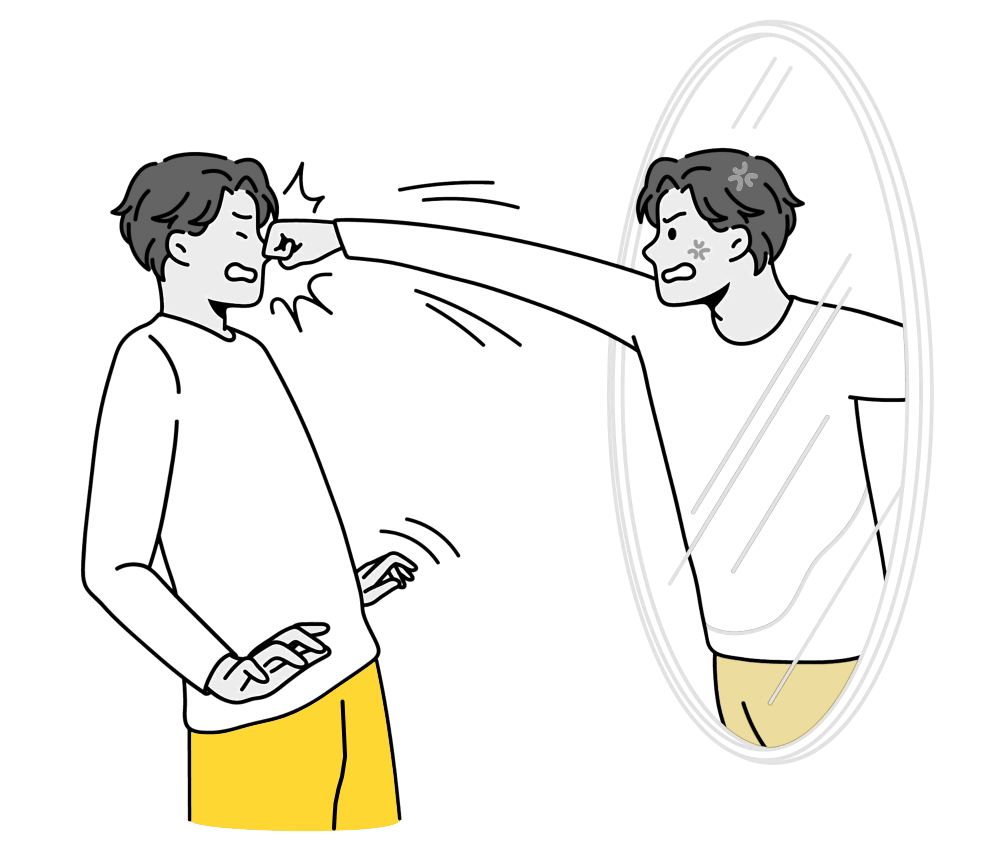If you’re a regular reader of Valet., then you're already well-versed in the art and science of self-care. But let's get one thing straight: There's a difference between taking care of yourself and being kind to yourself. If only it was as easy as copping a new pair of shoes or kicking back with a hydrating sheet mask. Those are nice, but as we all know, they don't really lead to fulfillment, contentment or satisfaction with one's life. Those can seem elusive to even the most successful and confident men.
In fact, a study by the charity CALM (the Campaign Against Living Miserably) discovered that four in 10 men have at some point thought about taking their own lives. In the U.S., a man dies by suicide every 14.4 minutes. And there are nearly four male deaths by suicide for each female death by suicide. Our self worth—or perhaps, our lack of it—is clearly a serious issue that deserves attention.

Often, we're our own worst critic. And when we're overwhelmed with anxiety, overly stressed or feeling frustrated, we talk to ourselves far more harshly than we'd ever let someone speak to us. I didn't get shit done today. I blew that presentation. What made me think I could do that? I'll never find a date. We wrongly assume that criticism will motivate us to do better.
Self-compassion allows us to better manage our feelings and emotions, along with the existential angst and unhappiness that bubbles up from time to time. The good news is that people who have greater levels of self-compassion tend to be more motivated, less lazy, and more successful over time. What's more, they tend to recover better (and faster) from psychological knocks, like relationship breakups or career setbacks. We got some expert advice on how to be kinder to yourself and these four tactics are as simple as they are effective.
Advertisement
Let Go of Your Negativity Bias
You know how we immediately recognize our own mistakes but sometimes completely miss that we've succeeded or accomplished something? Psychologists call this a “negativity bias.” Unfortunately, this phenomenon seems to be hardwired into our brains. Sure, it's helpful to learn from our mistakes, but way too often, we tend to dwell on them for longer than necessary. Shahroo Izadi, a behavioral change specialist and author of The Kindness Method, reminds us to check-in with ourselves when we've done something we're not proud of and can't let it go. She says that if you've done all you can to rectify the situation, but are still beating yourself up internally, ask yourself: “Would it take me this long to forgive someone else?”
Understand Your Sabotaging Patterns
A good self-compassion tactic involves knowing what sets you off. Psychologist and author of The Healthy Mind Toolkit, Dr. Alice Boyes, says that she recognizes that she overworks when she gets anxious. Not great for her, but even worse for those around her when she drags them into it. Being kinder to yourself means acknowledging your patterns and making better choices. For Dr. Boyes, it means recognizing the need to nitpick because she wants control, but slowing down and thinking about the bigger picture helps her take the necessary breaks to feel better overall.
Advertisement
Reframe Judgmental Thoughts
When your inner critic shows up, he's always got a lot to say, right? But those judgmental thoughts aren't factual. Brooke Schwartz, a licensed psychotherapist, says that instead of taking these statements at face value, “it can be helpful to reframe them in a factual, objective manner. In doing so, you will help yourself reflect on what this kind of self-criticism means in a less punishing, more compassionate way.” Letting go of judgements and simply dealing with facts allows you to see the situation a little more clearly. Schwartz says it “removes the judgmental haze that can pull you into an alternative reality based on your interpretations and assumptions about yourself and the world.”
Just Let Go
Sometimes, the kindest thing you can do for yourself is to let go and just be for a while. You don't have to “work” on anything or “focus” on yourself. Just do whatever makes you happy. It could be firing up your favorite movie and ordering Thai takeout or booking some time at your local rock-climbing wall. Give yourself the day off from worrying, stressing, or even meditation or other wellness practices. And if the downtime starts to trigger feelings of guilt, remind yourself that it's merely one day. And that it can do wonders for discomfort, stress, disappointment, loss and pain.
Do Unto Yourself

An easy way to think about self-kindness? Twist the golden rule: Treat yourself the way you'd treat a friend or a loved one. You're much more likely to be gracious, patient and forgiving.
Advertisement
































